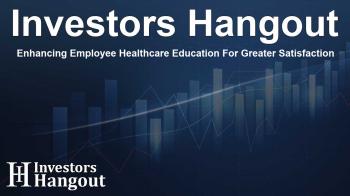Enhancing Employee Healthcare Education For Greater Satisfaction

Understanding the Importance of Healthcare Literacy
Optavise, a leader in employee benefits services, has unveiled a pivotal report on healthcare literacy. This report emphasizes the transformative impact of personal interactions in educating employees about their benefits. In a world where healthcare plans can often feel overwhelming, clear communication can make all the difference.
Current State of Employee Satisfaction
The recent findings reveal that a significant 74% of employees now express high levels of satisfaction with their health plans. This is an increase from the previous year and reflects a broader trend towards greater awareness and understanding of healthcare options. "Understanding how benefits work is essential for employees to feel confident and satisfied with their plans," said Joshua Madson, Head of Worksite Strategy at Optavise.
The Role of Education and Support
One important insight from the report is that employees who receive guidance from HR personnel or third-party experts are significantly more likely to feel confident in navigating their benefits. While many still attempt to self-navigate using online resources, the support provided by knowledgeable staff leads to better outcomes and greater satisfaction.
Challenges in Navigating Healthcare Benefits
Despite the progress, there are still considerable challenges. Many employees cite difficulty in understanding certain key terms of their health plans. For instance, terms like "coinsurance" can bewilder a substantial number of workers, indicating a pressing need for additional educational resources.
Importance of Accessibility
Access to benefits plays a significant role in employee satisfaction. An impressive 87% of satisfied employees found it easy to access their benefits, highlighting the importance of straightforward processes. On the contrary, those who struggle to access their benefits often report low confidence in their understanding of how their plans operate.
Addressing Financial Concerns
With healthcare costs continuing to climb, there is an increasing awareness among employees regarding expenses. A notable 55% of employees have skipped medical visits due to cost worries. This awareness not only drives employees to seek more information but also provides an opportunity for employers to facilitate better understanding and decision-making regarding healthcare costs.
Engagement in Wellness Programs
Employee participation in wellness programs is on the rise, especially when incentives are involved. Those who offer such programs tend to see an impressive 86% engagement. Employees have expressed interest in various wellness initiatives, from healthy eating and fitness tracking to mental health support.
Personalization as a Key Factor
Personalization is crucial for enhancing employee engagement in benefits programs. An overwhelming 96% of employees consider having tailored benefit options to be very important. Customized programs not only meet the specific needs of employees but also improve overall satisfaction and participation rates.
The Need for Ongoing Education
Despite promising advancements, the need for continuous investment in benefits education remains. Significant portions of employees still feel uncertain about their healthcare plans. For example, many employees lack confidence in understanding their health plan’s intricacies.
The Significance of Onboarding Education
Employee onboarding offers a critical opportunity to provide essential benefits training. Many identify benefits as a deciding factor when changing jobs, reinforcing the need for thorough education right from the start. By offering informative sessions and one-on-one support, employers can guide new hires through their options effectively.
Measuring Employee Satisfaction in Benefits
Understanding employee satisfaction regarding benefits is essential for employers looking to enhance their offerings. The insights provided by Optavise illustrate how crucial effective communication and support are in satisfying and retaining employees. A well-informed workforce is likely to make better healthcare decisions, ultimately promoting a healthier and more engaged work environment.
Frequently Asked Questions
What is healthcare literacy?
Healthcare literacy refers to the ability to understand and utilize health information, enabling employees to make informed decisions about their benefits.
How does Optavise educate employees about their benefits?
Optavise offers personalized education through HR teams and third-party experts, providing tools and resources to help employees navigate their benefits effectively.
What percentage of employees are satisfied with their health plans?
Currently, 74% of employees report being very satisfied with their health plans, reflecting an increase from the previous year.
Why is personalized education important?
Personalized education helps address individual needs, ensuring that employees better understand their options and thereby enhancing their overall satisfaction and engagement.
How can employers improve employee engagement in wellness programs?
Employers can improve engagement by offering incentives and personalized programs tailored to employee interests in areas like fitness, mental health, and financial wellness.
About The Author
Contact Logan Wright privately here. Or send an email with ATTN: Logan Wright as the subject to contact@investorshangout.com.
About Investors Hangout
Investors Hangout is a leading online stock forum for financial discussion and learning, offering a wide range of free tools and resources. It draws in traders of all levels, who exchange market knowledge, investigate trading tactics, and keep an eye on industry developments in real time. Featuring financial articles, stock message boards, quotes, charts, company profiles, and live news updates. Through cooperative learning and a wealth of informational resources, it helps users from novices creating their first portfolios to experts honing their techniques. Join Investors Hangout today: https://investorshangout.com/
The content of this article is based on factual, publicly available information and does not represent legal, financial, or investment advice. Investors Hangout does not offer financial advice, and the author is not a licensed financial advisor. Consult a qualified advisor before making any financial or investment decisions based on this article. This article should not be considered advice to purchase, sell, or hold any securities or other investments. If any of the material provided here is inaccurate, please contact us for corrections.

